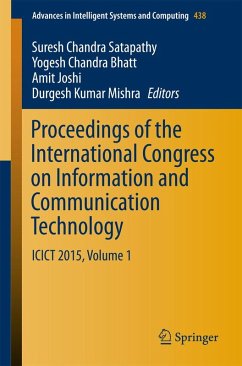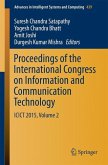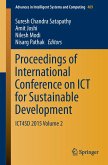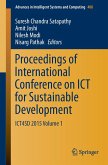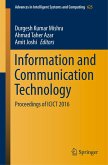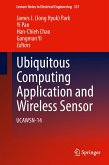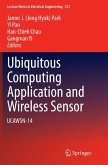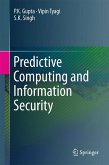Proceedings of the International Congress on Information and Communication Technology
ICICT 2015, Volume 1
Herausgegeben:Satapathy, Suresh Chandra; Bhatt, Yogesh Chandra; Joshi, Amit; Mishra, Durgesh Kumar
Proceedings of the International Congress on Information and Communication Technology
ICICT 2015, Volume 1
Herausgegeben:Satapathy, Suresh Chandra; Bhatt, Yogesh Chandra; Joshi, Amit; Mishra, Durgesh Kumar
- Broschiertes Buch
- Merkliste
- Auf die Merkliste
- Bewerten Bewerten
- Teilen
- Produkt teilen
- Produkterinnerung
- Produkterinnerung
This volume contains 69papers presented at ICICT 2015: International Congress on Information andCommunication Technology. The conference was held during 9th and 10thOctober, 2015, Udaipur, India and organized by CSI Udaipur Chapter, DivisionIV, SIG-WNS, SIG-e-Agriculture in association with ACM Udaipur ProfessionalChapter, The Institution of Engineers (India), Udaipur Local Centre and MiningEngineers Association of India, Rajasthan Udaipur Chapter. This volume containspapers mainly focused on ICT for Managerial Applications, E-governance, IOT and E-Mining.
Andere Kunden interessierten sich auch für
![Proceedings of the International Congress on Information and Communication Technology Proceedings of the International Congress on Information and Communication Technology]() Proceedings of the International Congress on Information and Communication Technology162,99 €
Proceedings of the International Congress on Information and Communication Technology162,99 €![Proceedings of International Conference on ICT for Sustainable Development Proceedings of International Conference on ICT for Sustainable Development]() Proceedings of International Conference on ICT for Sustainable Development162,99 €
Proceedings of International Conference on ICT for Sustainable Development162,99 €![Proceedings of International Conference on ICT for Sustainable Development Proceedings of International Conference on ICT for Sustainable Development]() Proceedings of International Conference on ICT for Sustainable Development162,99 €
Proceedings of International Conference on ICT for Sustainable Development162,99 €![Information and Communication Technology Information and Communication Technology]() Information and Communication Technology121,99 €
Information and Communication Technology121,99 €![Ubiquitous Computing Application and Wireless Sensor Ubiquitous Computing Application and Wireless Sensor]() Ubiquitous Computing Application and Wireless Sensor162,99 €
Ubiquitous Computing Application and Wireless Sensor162,99 €![Ubiquitous Computing Application and Wireless Sensor Ubiquitous Computing Application and Wireless Sensor]() Ubiquitous Computing Application and Wireless Sensor162,99 €
Ubiquitous Computing Application and Wireless Sensor162,99 €![Predictive Computing and Information Security Predictive Computing and Information Security]() PK GuptaPredictive Computing and Information Security89,99 €
PK GuptaPredictive Computing and Information Security89,99 €-
-
-
This volume contains 69papers presented at ICICT 2015: International Congress on Information andCommunication Technology. The conference was held during 9th and 10thOctober, 2015, Udaipur, India and organized by CSI Udaipur Chapter, DivisionIV, SIG-WNS, SIG-e-Agriculture in association with ACM Udaipur ProfessionalChapter, The Institution of Engineers (India), Udaipur Local Centre and MiningEngineers Association of India, Rajasthan Udaipur Chapter. This volume containspapers mainly focused on ICT for Managerial Applications, E-governance, IOT and E-Mining.
Produktdetails
- Produktdetails
- Advances in Intelligent Systems and Computing 438
- Verlag: Springer / Springer Nature Singapore / Springer, Berlin
- Artikelnr. des Verlages: 978-981-10-0766-8
- 1st ed. 2016
- Seitenzahl: 692
- Erscheinungstermin: 5. Juni 2016
- Englisch
- Abmessung: 235mm x 155mm x 37mm
- Gewicht: 1036g
- ISBN-13: 9789811007668
- ISBN-10: 9811007667
- Artikelnr.: 44538454
- Herstellerkennzeichnung Die Herstellerinformationen sind derzeit nicht verfügbar.
- Advances in Intelligent Systems and Computing 438
- Verlag: Springer / Springer Nature Singapore / Springer, Berlin
- Artikelnr. des Verlages: 978-981-10-0766-8
- 1st ed. 2016
- Seitenzahl: 692
- Erscheinungstermin: 5. Juni 2016
- Englisch
- Abmessung: 235mm x 155mm x 37mm
- Gewicht: 1036g
- ISBN-13: 9789811007668
- ISBN-10: 9811007667
- Artikelnr.: 44538454
- Herstellerkennzeichnung Die Herstellerinformationen sind derzeit nicht verfügbar.
Dr. Suresh Chandra Satapathy is currently working as Professor and Head, Dept. of CSE at Anil Neerukonda Institute of Technology and Sciences (ANITS), Andhra Pradesh, India. He obtained his Ph.D. in Computer Science and Engineering from JNTU Hyderabad and M. Tech in CSE from NIT, Rourkela, Odisha, India. He has 26 years of teaching experience. His research interests are data mining, machine intelligence and swarm intelligence. He has acted as program chair of many international conferences and edited 6 volumes of proceedings from Springer LNCS and AISC series. He is currently guiding 8 Ph.D. scholars. Dr. Satapathy is also a Sr. Member, IEEE. Dr. Yogesh Chandra Bhatt - Graduated from CTAE, Udaipur (1978) and M.Tech (1980) & Ph.D. (1989) from IIT Kharagpur. Currently, working as Dean (Student Welfare) & Chairman (University Sports Board), Professor & Project In-charge (FIM, FMTC) Dept. of FMP, CTAE, MPUAT, Udaipur with 36 years of service experience. Professional Agricultural Engineer worked in all divisions of Teaching, Research and Extension wing of the University. Head of Dept. for 7 years. Published more than 50 research papers in International and National Journals, Seminar & Conferences, edited 6 books, 5 Proceedings and guided 15 PG students for M.Tech and Ph.D. degree. Completed 10 Adhoc research projects. Developed 10 prototype technologies on farm mechanization. As an active member served as Honorary Secretary ( 2009-11) and Chairman (2011-13) of The Institution of Engineers India, Udaipur Local Centre. Organized 3 International Conferences and 18 National Conventions & All India Seminar of IEI and ISAE. Published Members Directory of IEI, ULC. Started Er.MP Baya and Mrs Sheela Baya National Award Rs. 50000/- and Rs. 25000/- and Scholarship for Engineering Students Rs. 60000/- per year from IEI Udaipur. Vice Chairman ISAE, Rajasthan Chapter for 8 years and Director of Farm Power and Machinery Group in ISAE for the year 2012-15. National Convener of SIG on e-Agriculture in the banner of CSI working on application of ICT techniques in farm machinery. Received awards of Appreciation Certificate for outstanding services in MPUAT, Udaipur (2009) and Scroll of Honour from with Recognition of Eminent Contribution in the field of Agri Engineering (2013) IEI Kolkata. Fellow and Chartered Engineers of IEI, and Life member of ISAE, SESI, CSI and Member ACM. Patron of Rajasthan Agricultural Machinery Association, Jaipur. Working as Chairman of Computer Society of India (CSI) Udaipur Chapter 2015-16 and Vice Chairman of Association of Computing Machinery(ACM) Udaipur Chapter. Mr. Amit Joshi has an experience of around 6 years in academic and industry in prestigious organizations of Rajasthan and Gujarat. Currently, he is working as an Assistant Professor in Department of Information Technology at Sabar Institute in Gujarat. He is an active member of ACM, CSI, AMIE, IEEE, IACSIT-Singapore, IDES, ACEEE, NPA and many other professional societies. He is Honorary Secretary of CSI Udaipur Chapter and Honorary Secretary for ACM Udaipur Chapter. He has presented and published more than 40 papers in National and International Journals/Conferences of IEEE, Springer, and ACM. He has also edited three books on diversified subjects including Advances in Open Source Mobile Technologies, ICT for Integrated Rural Development and ICT for Competitive Strategies. He has also organized more than 25 National and International Conferences and Workshops including International Conference ETNCC 2011 at Udaipur through IEEE, International Conference ICTCS - 2014 at Udaipur through ACM, International Conference ICT4SD 2015 - by Springer recently. He has also served on Organising and Program Committee of more than 50 Conferences/Seminars/Workshops throughout the World and presented 6 invited talks in various conferences. For his contribution towards the society, The Institution of Engineers (India), ULC, has given him Appreciation award on the celebration of Engineers, 2014 and by SIG-WNs Computer Society of India on ACCE , 2012. Dr. Durgesh Kumar Mishra has received M.Tech degree in Computer Science from DAVV, Indore in 1994 and Ph.D. degree in Computer Engineering in 2008. Presently, he is working as a Professor (CSE) and Director, Microsoft Innovation Centre at Shri Aurobindo Institute of Technology, Indore, MP, India. He is also a visiting faculty at IIT-Indore, MP, India. He has 24 years of teaching and 10 years of research experience. He completed his Ph.D. under the guidance of late Dr. M. Chandwani on Secure Multi-Party Computation for Preserving Privacy. He has published more than 90 papers in refereed international/national journals and conferences including IEEE, ACM conferences. He has organized many such conference like WOCN, CONSEG and CSIBIG in the capacity of conference General Chair and editor of conference proceeding. His publications are listed in DBLP, Citeseer-x, Elsevier and Scopus. He is a Senior Member of IEEE and held many positions like Chairman, IEEE MP-Subsection (2011-2012), and Chairman IEEE Computer Society Bombay Chapter (2009-2010). Dr. Mishra has also served the largest technical and profession association of India, the Computer Society of India (CSI) by holding positions as Chairman, CSI Indore Chapter, State Student Coordinator- Region III MP, Member-Student Research Board, Core Member-CSI IT Excellence Award Committee. At present he is Chairman CSI Division IV Communication at National Level (2014-2016). Dr. Mishra has delivered his tutorials in IEEE International conferences in India as well as abroad. He is also the programme committee member, and reviewer of several international conferences. He visited and delivered his invited talk in Taiwan, Bangladesh, Singapore, Nepal, USA, UK and France. He has authored a book on "Database Management Systems". He had been Chief Editor of Journal of Technology and Engineering Sciences. He has been also serving as member of Editorial Board of many national and international refereed journals. He has been a consultant to industries and government organizations like sales tax and labour department of government of Madhya Pradesh, India. He has been awarded with "Paper Presenter award at International Level" by Computer Society of India. Recently in month of June, he visited MIT Boston and presented his presentation on Security and Privacy. He has also Chaired a panel on "Digital Monozukuri" at "Norbert Winner in 21st century" at Boston. Recently, he became the Member of Bureau of Indian Standards (BIS), Govt. of India for Information Security domain.
Chapter 1. Resource Management Using Virtual Machine Migrations.- Chapter 2. Framework of Compressive Sampling with its Applications to One and Two Dimensional Signals.- Chapter 3. Carbon Footprints Estimation of a Novel Environment-aware Cloud Architecture.- Chapter 4. Examining Usability of Classes in Collaboration with SPL Feature Model.- Chapter 5. Do Bad Smells follow some Pattern?.- Chapter 6. Ultra-Wideband Antenna with Triple Band Notched Characteristics.- Chapter 7. Utilizing NL Text for generating UML Diagrams.- Chapter 8. 2-D Photonic Crystal Based Solar Cell.- Chapter 9.Parallel Implantation of Frequent Itemset Mining Using Inverted Matrix Based on OpenCL.- Chapter 10. Extended Visual Secret Sharing with Cover Images Using Half Toning.- Chapter 11. Resonant Cavity Based Optical Wavelength De-multiplexer Using SOI Photonic Crystals.- Chapter 12. A Frequency Reconfigurable Antenna with Six Switchable Modes for Wireless Application.- Chapter 13. Comparative Analysis of Digital Watermarking Techniques.-Chapter 14. Design and Analysis of 1x6 Power Splitter Based on the Ring Resonator.- Chapter 15. Performance Evaluation of Vehicular Ad-hoc Network Using SUMO and NS2.- Chapter 16. An Intrusion Detection System for detecting Denial of Service Attack in Cloud by Using Artificial Bee Colony.- Chapter 17. Multi-Cavity Photonic Crystal Waveguide Based Ultra-Compact Pressure Sensor.- Chapter 18. Role Based Access Mechanism/Policy for Enterprise Data in Cloud.- Chapter 19. Big Data in Precision Agriculture through ICT: Rainfall Prediction Using Neural Network Approach.- Chapter 20. Evaluating Interactivity with respect to Distance and Orientation Variables of GDE Model.- Chapter 21. Comparative Evaluation of SVD-TR Model for Eye-Gaze Based Systems.- Chapter 22. Identity Based Key Management.- Chapter 23.Firefly Algorithm Hybridized with Flower Pollination Algorithm for Multimodal Functions.- Chapter 24. Uniqueness in User Behavior while Using the Web.- Chapter 25. Prediction of ERP Outcome Measurement and User Satisfaction by using Adaptive Neuro Fuzzy Inference System and SVM Classifiers Approach.- Chapter 26. UWB Antenna with Band Rejection for WLAN/WIMAX Band.- Chapter 27. Consequence of PAPR Reduction in OFDM System on Spectrum & Energy Efficiencies Using Modified PTS Algorithm.- Chapter 28. Energy Efficient Resource Provisioning Through Power Stability Algorithm in Cloud Computing.- Chapter 29. Comparative Analysis of Scalability and Energy Efficiency of Ordered Walk Learning Routing Protocol.- Chapter 30. A Novel Technique for Voltage Flicker Mitigation Using Dynamic Voltage Restorer.- Chapter31. Gaussian Membership Function Based Speaker Identification Using Score Level Fusion of MFCC and GFCC.- Chapter 32. Efficient Local and Global Color Histogram Feature for Color Content Based Image Retrieval System.- Chapter 33. Energy Efficient Pollution Monitoring System Using Deterministic Wireless Sensor Networks.- Chapter 34. Development of Electronic Control System to Automatically Adjust Spray Output.- Chapter 35. Social Impact Theory Based Node Placement Strategy for Wireless Sensor Networks.- Chapter 36. Bang ofSocial Engineering in Social Networking Sites.- Chapter 37. Internet of Things (IoT): In a Way of Smart World.- Chapter 38. A Study of Routing Protocols for MANETs.- Chapter 39. Modelling Social Aspects of E-agriculture in India for Semantic Web.- Chapter 40. An Efficient Adaptive Data Hiding Scheme for Image Steganography.- Chapter 41. A Five-Layer Framework for Organizational Knowledge Management.- Chapter 42. A Survey on Big Data Architectures and Standard Bodies.- Chapter 43. Generating Data for Testing Community Detection Algorithms.- Chapter 44. Metamorphic Malware Detection using LLVM IR and Hidden Markov Model.- Chapter 45. Object Based Graphical User Authentication Scheme.- Chapter 46. Efficient Density Based Clustering Using Automatic Parameter Detection.- Chapter 47. Implementationof GIS Based Decision Support System for Crop Selection: A Case for Autumn (Kharif) Crops.- Chapter 48. WT Based Distributed Generation Location Minimizing Transmission Loss Using Mixed Integer Non-Linear Programming in Deregulated Electricity Market.- Chapter 49. Use Case Based Software Change Analysis and Reducing Regression Test Effort.- Chapter 50. Tackling Supply Chain Management through RFID: Opportunities and Challenges.- Chapter 51.Quality Improvement of Fingerprint Recognition System.- Chapter 52. A Composite Approach to Digital Video Watermarking.- Chapter 53. Effective Congestion less Dynamic Source Routing for Data Transmission in MANETs.- Chapter 54. Implementation & Integration of Cellular/GPS Based Vehicle Tracking System with Google Maps Using a Web Portal.- Chapter 55. ImageSegmentation Using Two Dimensional Renyi Entropy.- Chapter 56. Supervised Learning Paradigm Based on Least Square Support Vector Machine for Contingency Ranking in a Large Power System.-Chapter 57. Process flow for Information Visualization in Biological Data.- Chapter 58. A Performance Analysis of High Level MapReduce Query Languages in Big Data.- Chapter 59.Variance Based Clustering for Balanced Clusters in Growing Datasets.- Chapter 60. Conceptual Framework for Knowledge Management in Agriculture Domain.- Chapter 61. Modularity-Based Community Detection in Fuzzy Granular Social Networks.- Chapter 62. Auto Characterization of Learning Materials: An Adaptive Approach to Personalized Learning Material Recommendation.- Chapter63. Hadoop with Intuitionistic Fuzzy C-Means for Clustering in Big Data.- Chapter 64. A Framework for Group Decision Support System using Cloud Database for Broadcasting Earthquake Occurrences.- Chapter 65. Advanced Persistent Threat Model for Testing Industrial Control System Security Mechanisms.- Chapter 66. E-Reader Deployment in Namibia: Fantasy or Reality?.- Chapter 67. Multi-Region Pre-Routing in Large Scale Mobile Ad-hoc Networks (MRPR).-Chapter 68. Challenges Faced in Deployment of e-Learning Models in India.- Chapter 69. A Novel Cross-Layer Mechanism for Improving H.264/AVC Video Transmissions over IEEE 802.11n WLANs.
Chapter 1. Resource Management Using Virtual Machine Migrations.- Chapter 2. Framework of Compressive Sampling with its Applications to One and Two Dimensional Signals.- Chapter 3. Carbon Footprints Estimation of a Novel Environment-aware Cloud Architecture.- Chapter 4. Examining Usability of Classes in Collaboration with SPL Feature Model.- Chapter 5. Do Bad Smells follow some Pattern?.- Chapter 6. Ultra-Wideband Antenna with Triple Band Notched Characteristics.- Chapter 7. Utilizing NL Text for generating UML Diagrams.- Chapter 8. 2-D Photonic Crystal Based Solar Cell.- Chapter 9.Parallel Implantation of Frequent Itemset Mining Using Inverted Matrix Based on OpenCL.- Chapter 10. Extended Visual Secret Sharing with Cover Images Using Half Toning.- Chapter 11. Resonant Cavity Based Optical Wavelength De-multiplexer Using SOI Photonic Crystals.- Chapter 12. A Frequency Reconfigurable Antenna with Six Switchable Modes for Wireless Application.- Chapter 13. Comparative Analysis of Digital Watermarking Techniques.-Chapter 14. Design and Analysis of 1x6 Power Splitter Based on the Ring Resonator.- Chapter 15. Performance Evaluation of Vehicular Ad-hoc Network Using SUMO and NS2.- Chapter 16. An Intrusion Detection System for detecting Denial of Service Attack in Cloud by Using Artificial Bee Colony.- Chapter 17. Multi-Cavity Photonic Crystal Waveguide Based Ultra-Compact Pressure Sensor.- Chapter 18. Role Based Access Mechanism/Policy for Enterprise Data in Cloud.- Chapter 19. Big Data in Precision Agriculture through ICT: Rainfall Prediction Using Neural Network Approach.- Chapter 20. Evaluating Interactivity with respect to Distance and Orientation Variables of GDE Model.- Chapter 21. Comparative Evaluation of SVD-TR Model for Eye-Gaze Based Systems.- Chapter 22. Identity Based Key Management.- Chapter 23.Firefly Algorithm Hybridized with Flower Pollination Algorithm for Multimodal Functions.- Chapter 24. Uniqueness in User Behavior while Using the Web.- Chapter 25. Prediction of ERP Outcome Measurement and User Satisfaction by using Adaptive Neuro Fuzzy Inference System and SVM Classifiers Approach.- Chapter 26. UWB Antenna with Band Rejection for WLAN/WIMAX Band.- Chapter 27. Consequence of PAPR Reduction in OFDM System on Spectrum & Energy Efficiencies Using Modified PTS Algorithm.- Chapter 28. Energy Efficient Resource Provisioning Through Power Stability Algorithm in Cloud Computing.- Chapter 29. Comparative Analysis of Scalability and Energy Efficiency of Ordered Walk Learning Routing Protocol.- Chapter 30. A Novel Technique for Voltage Flicker Mitigation Using Dynamic Voltage Restorer.- Chapter31. Gaussian Membership Function Based Speaker Identification Using Score Level Fusion of MFCC and GFCC.- Chapter 32. Efficient Local and Global Color Histogram Feature for Color Content Based Image Retrieval System.- Chapter 33. Energy Efficient Pollution Monitoring System Using Deterministic Wireless Sensor Networks.- Chapter 34. Development of Electronic Control System to Automatically Adjust Spray Output.- Chapter 35. Social Impact Theory Based Node Placement Strategy for Wireless Sensor Networks.- Chapter 36. Bang ofSocial Engineering in Social Networking Sites.- Chapter 37. Internet of Things (IoT): In a Way of Smart World.- Chapter 38. A Study of Routing Protocols for MANETs.- Chapter 39. Modelling Social Aspects of E-agriculture in India for Semantic Web.- Chapter 40. An Efficient Adaptive Data Hiding Scheme for Image Steganography.- Chapter 41. A Five-Layer Framework for Organizational Knowledge Management.- Chapter 42. A Survey on Big Data Architectures and Standard Bodies.- Chapter 43. Generating Data for Testing Community Detection Algorithms.- Chapter 44. Metamorphic Malware Detection using LLVM IR and Hidden Markov Model.- Chapter 45. Object Based Graphical User Authentication Scheme.- Chapter 46. Efficient Density Based Clustering Using Automatic Parameter Detection.- Chapter 47. Implementationof GIS Based Decision Support System for Crop Selection: A Case for Autumn (Kharif) Crops.- Chapter 48. WT Based Distributed Generation Location Minimizing Transmission Loss Using Mixed Integer Non-Linear Programming in Deregulated Electricity Market.- Chapter 49. Use Case Based Software Change Analysis and Reducing Regression Test Effort.- Chapter 50. Tackling Supply Chain Management through RFID: Opportunities and Challenges.- Chapter 51.Quality Improvement of Fingerprint Recognition System.- Chapter 52. A Composite Approach to Digital Video Watermarking.- Chapter 53. Effective Congestion less Dynamic Source Routing for Data Transmission in MANETs.- Chapter 54. Implementation & Integration of Cellular/GPS Based Vehicle Tracking System with Google Maps Using a Web Portal.- Chapter 55. ImageSegmentation Using Two Dimensional Renyi Entropy.- Chapter 56. Supervised Learning Paradigm Based on Least Square Support Vector Machine for Contingency Ranking in a Large Power System.-Chapter 57. Process flow for Information Visualization in Biological Data.- Chapter 58. A Performance Analysis of High Level MapReduce Query Languages in Big Data.- Chapter 59.Variance Based Clustering for Balanced Clusters in Growing Datasets.- Chapter 60. Conceptual Framework for Knowledge Management in Agriculture Domain.- Chapter 61. Modularity-Based Community Detection in Fuzzy Granular Social Networks.- Chapter 62. Auto Characterization of Learning Materials: An Adaptive Approach to Personalized Learning Material Recommendation.- Chapter63. Hadoop with Intuitionistic Fuzzy C-Means for Clustering in Big Data.- Chapter 64. A Framework for Group Decision Support System using Cloud Database for Broadcasting Earthquake Occurrences.- Chapter 65. Advanced Persistent Threat Model for Testing Industrial Control System Security Mechanisms.- Chapter 66. E-Reader Deployment in Namibia: Fantasy or Reality?.- Chapter 67. Multi-Region Pre-Routing in Large Scale Mobile Ad-hoc Networks (MRPR).-Chapter 68. Challenges Faced in Deployment of e-Learning Models in India.- Chapter 69. A Novel Cross-Layer Mechanism for Improving H.264/AVC Video Transmissions over IEEE 802.11n WLANs.

